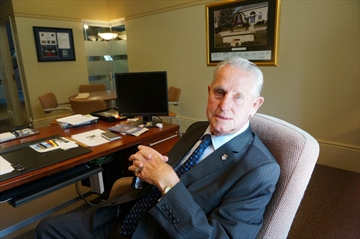Repost from The Hamilton Spectator
Milton residents ‘will be lying down on the tracks’ to prevent surprise CN plan
By San Grewal, March 17, 2015
A “David and Goliath” battle is shaping up in Milton, where the Toronto Star has learned CN is about to announce plans for a 400-acre rail distribution centre that throws a wrench into the region’s carefully crafted growth management strategy.
Milton’s mayor and top bureaucrat are vowing the town will not go down without a fight.
“We have 50,000 residents, 20,000 houses planned for the area north of this (intermodal) facility. CN came in last week and pronounced that they are going forward — no formal application, no formal announcement,” said Milton’s chief administrative officer, William Mann.
“We know they are announcing it on Thursday. When Milton residents hear about this, they will be lying down on the tracks.”
Mann said the town, one of Canada’s fastest growing municipalities, has been told that CN, as a former Crown corporation, still has a certain power to circumvent municipal planning as governed by the province of Ontario.
Mann and Mayor Gord Krantz told the Star the town has been “blindsided” by the plan for a facility between Britannia Rd. and Lower Base Line that the town says would operate 24/7, transferring containers between trains and trucks. The town says it would bring 1,500 trucks and four additional trains into Milton every day, on CN-owned land that isn’t supposed to be used for such a facility according to Milton’s planning strategy.
Under Sustainable Halton, the region’s widely lauded plan for growth management, the land has been earmarked for strategic employment, with a mix of residential and commercial development surrounding it, as well as environmentally protected lands.
“It’s completely contrary to what we had planned,” Krantz said. “If I knew what was being proposed by CN I certainly wouldn’t be purchasing. Or if I already purchased one (of the newly built homes) and I wanted to get out from under it — I can imagine the possible legal battles.”
But Krantz is vowing to do everything the town can to fight CN, even if the rail giant has the federal government on its side, along with its powers to ignore local planning jurisdiction.
Referring to the tale of David and Goliath, Krantz said: “We all know how that story ended. I’ve got my one shot ready.”
He said Milton is already working with Halton Region and other partners on a legal strategy, but said he didn’t want to tip his hand.
CN responded to the Star’s questions about the project with a brief statement: “CN owns approximately 1,000 acres of land in the Milton, Ont., area. As part of its ongoing business operations, CN continually reviews its facilities and real estate holdings to ensure they are adequate to accommodate growth in its various businesses. Such is the case with CN’s Milton property. CN has no further comment at this time.”
One of the world’s largest rail companies, CN has a market capitalization of almost $71 billion.
CN had proposed a similar project in 2001 — preceding the province’s strategy to manage growth — that was withdrawn after the town and region identified major issues with it, according to a news release from the Town of Milton.
Multiple sources told the Star the CN plan is to be unveiled Thursday at a breakfast event hosted by the local chamber of commerce. As the MP for Halton riding, Federal Transport Minister Lisa Raitt represents Milton. A statement from the ministry to the Star said only that Raitt would attend the Chamber event Thursday “and looks forward to the presentation.”
The Ministry of Municipal Affairs and Housing was asked whether the province would guarantee a public consultation and that provincial environmental and safety rules as well as municipal planning processes would be complied with. A spokesperson said the ministry, and the Ministry of Transportation, “have been advised by CN that they are revisiting the need for an intermodal yard in the Town of Milton … CN has not provided the province with specific details of their proposal.”
With concern mounting over rail safety in the wake of the Lac-Mégantic disaster and more recent fiery derailments of trains carrying crude oil, Krantz and Mann said they have been disheartened by the province’s unwillingness to address the CN plan.
When asked if he has an idea of what would be passing through the area, Krantz said: “That’s a good question. We don’t know what’s going to be transported.”
Beyond the negative impact on surrounding property values, and environmental and safety concerns, the development industry is going to be extremely upset with CN’s decision, he said.
“You ain’t seen nothing yet. Wait until the developers, especially in the residential sector, hear. I suspect their reaction will be something like mine.”
Mann said Milton has behaved like the model municipality for Ontario’s Places to Grow Act, which established managed population growth targets throughout the GTA. The town has grown from about 7,000 residents in 1971 to 84,362, according to the 2011 census.
“We could go to over 400,000 under Places to Grow. Places to Grow is all about taking your fair share. Now, upward of 500 acres of employment land and all the residential around it, could be taken out of the picture. That means the rest of the GTA will have to pick up that population.
“This plan has nothing but negative consequences for Milton, from a community perspective.”

